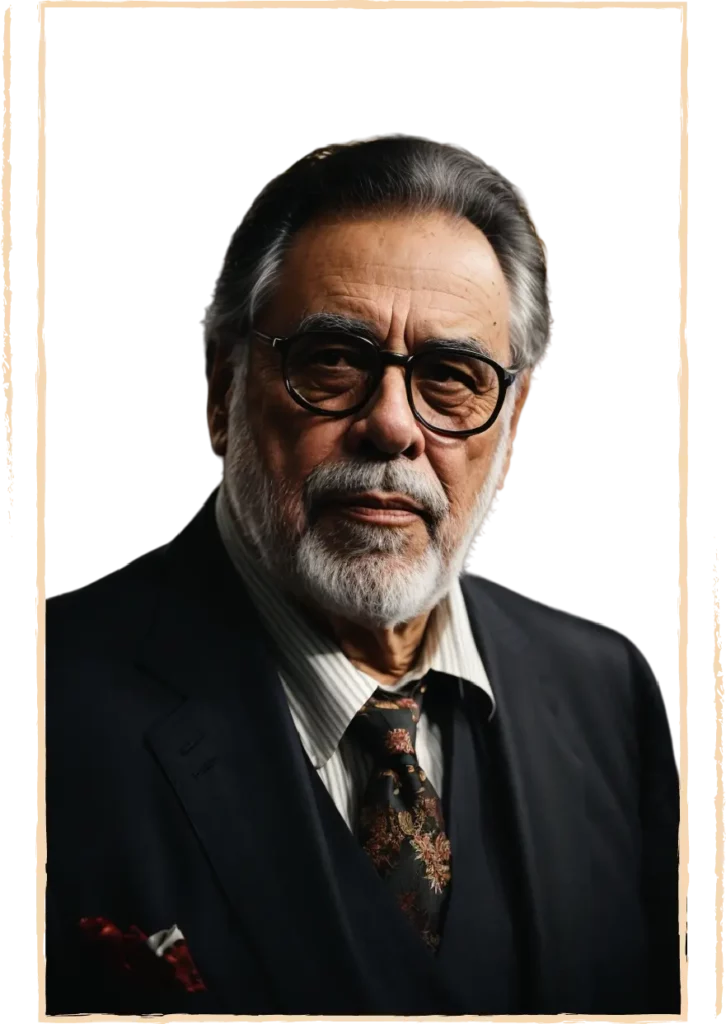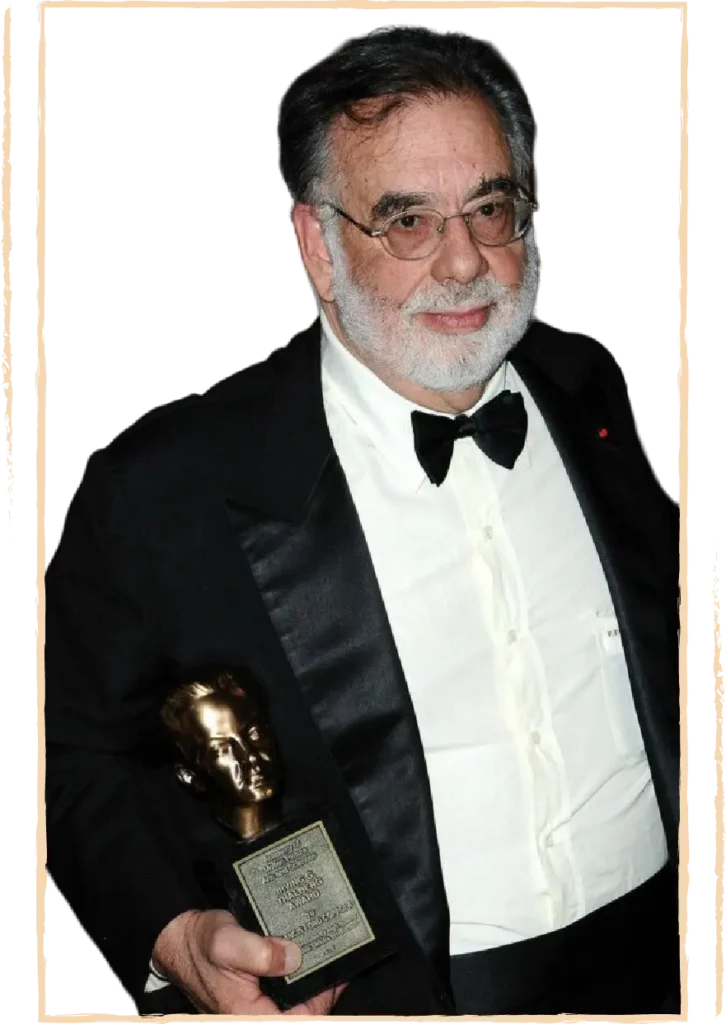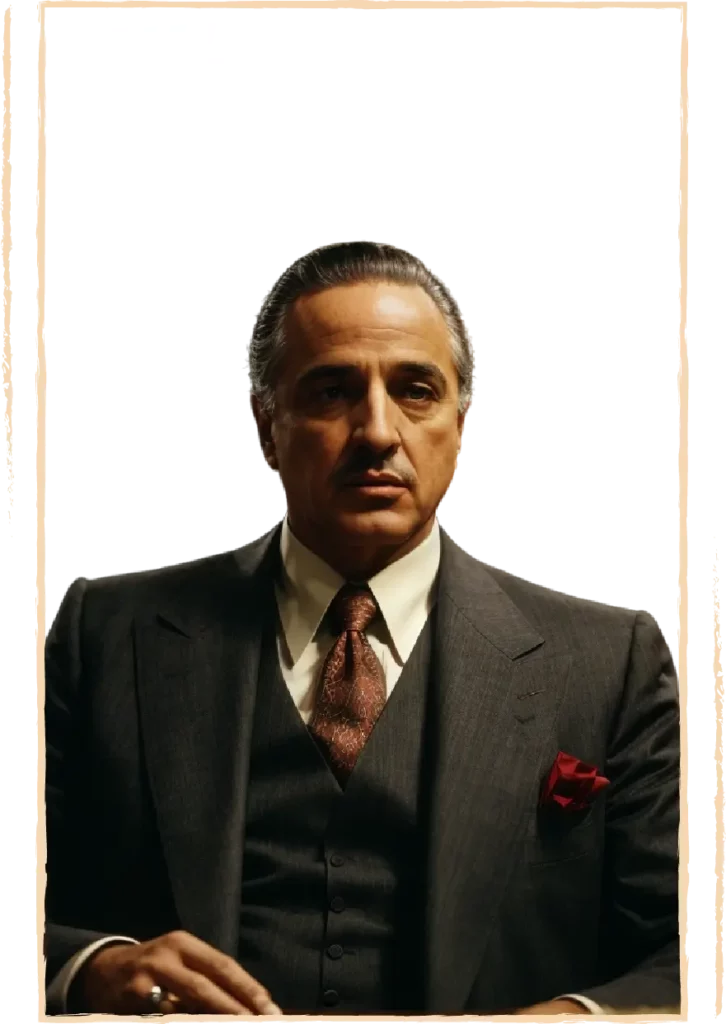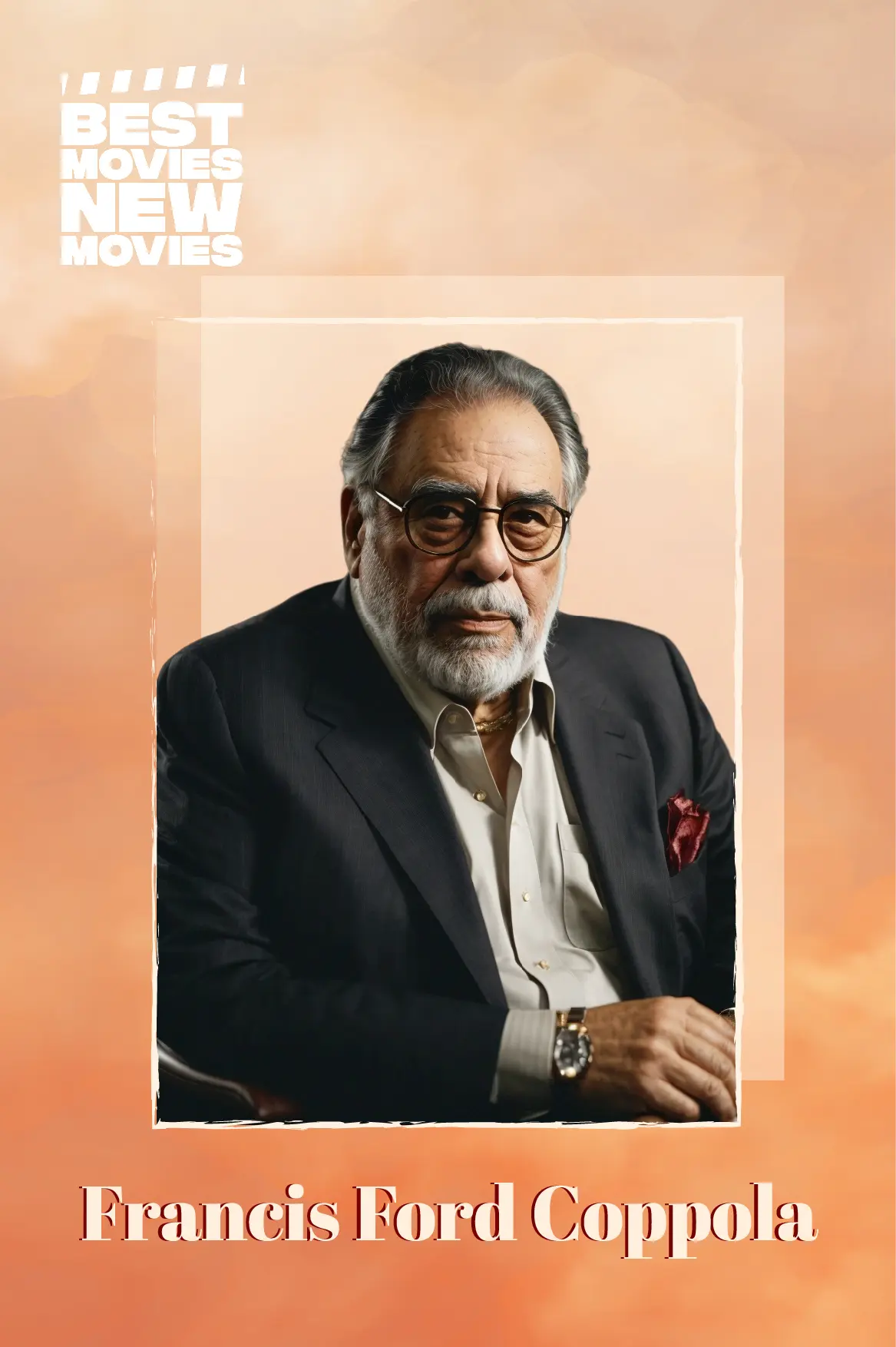Biography
You can’t mention the best films in history without mentioning The Godfather trilogy, and you can’t mention the best filmmakers in history without mentioning the brilliant mind behind that trilogy: Francis Ford Coppola! Coppola is one of the greatest filmmakers, screenwriters, and producers of all time. His name conjures up images of artistic genius and trailblazing narrative in the world of filmmaking.
The career of Francis Ford Coppola is a patchwork of timeless cinematic successes. From the sprawling drama of The Godfather trilogy, which immortalised the Corleone household, to the harrowing and emotional voyage of Apocalypse Now (1979), his films are distinguished by their dimension, complexity, and unrelenting dedication to narrative.
Throughout his career, Francis Ford Coppola established himself as one of the most important filmmakers in Hollywood; however, his career is full of lights and shadows, authentic masterpieces, underrated productions and others that were a resounding failure.
While he definitely has a rich body of work, Coppola will always be remembered as the mastermind behind the masterpieces of gangster cinema and the quintessential work of war that became the benchmark of what a good gangster film should be like!
With numerous feature films to his credit and tons of awards to his name, including five Oscars, four Golden Globes, one BAFTA, one Berlinale Camera, two Palmes d’Or, one Cannes Jury Prize, and an honorary Golden Lion, today we pay tribute to the life and work of the legendary filmmaker Francis Ford Coppola.
Who is Francis Ford Coppola?

Coppola was born in Detroit, Michigan, U.S., on 7 April 1939, and after two years, his family relocated to New York. He spent the last few years of his childhood in Woodside, Queens, with his older brother, August Coppola, an American academic, and his sister, Talia Shire, who is an actress.
Francis Ford Coppola comes from a creative family; his father, Carmine Coppola, was a musician and composer, and his mother, Italia Coppola, loved the theatre. Having grown up in this caring and imaginative atmosphere, young Francis has always had a strong interest in artwork.
Even though he suffered from polio as a child, his enthusiasm and interest in exploring different artistic fields never stopped. He produced home-made puppet shows while spending a lot of his childhood in bed. Additionally, he produced 8-mm feature films like The Rich Millionaire and The Lost Wallet that were made from home footage.
Coppola attended Hofstra University in New York, where he developed his writing, directing, and acting talents while studying theatre arts. After receiving his degree from Hofstra, Coppola enrolled in the University of California, Los Angeles (UCLA) film school, where he continued to hone his technical skills and storytelling prowess.
Francis Ford Coppola began his professional career with a wealth of experience and unyielding dedication. He would later go on to become one of the most renowned and influential directors of his generation, leaving an imprint that will never be erased from the movie industry.
Forging the Path to Success!

Francis Ford Coppola’s journey to fame in the film business was characterised by a blend of brilliance, tenacity, and a string of life-changing chances. He started to establish himself as a potential auteur by his early endeavours and partnerships, which laid the foundation for the extraordinary career that came later.
It all started when Coppola assisted indie cinema filmmaker Roger Corman on a number of low-budget films when he was still a student at UCLA. One of these films was the Russian science fiction film Nebo Zovyot, which was later adapted by Coppola into an English-language monster picture, which American International distributed as Battle Beyond the Sun (1962).
In 1962, while on location in Ireland shooting The Young Racers, Corman convinced Coppola to use the money remaining from that project to finance a low-cost horror film called Dementia 13 (1963). The film was Coppola’s debut feature film, which he directed in nine days with a $40,000 budget and his own original screenplay.
The film made back its low-budget production costs and went on to earn a small mythical following among horror fans since it was slightly better than the generic exploitation films being produced at the time. It is worth noting that Coppola first met Eleanor Jessie Neil, his future wife while working on the set of Dementia 13.
Coppola showed an uncompromising dedication to his imaginative ideas throughout his professional life, frequently taking chances and questioning social standards. His success was not just confined to his work as a filmmaker; it also included his work as a producer. His production firm, American Zoetrope, which he co-founded with George Lucas on 12 December 1969, became a centre for unprecedented and inventive films.
The 1970s: The Godfather of Them All!

After a few years, when Coppola worked on the critically praised film Patton (1970), he made a name for himself. Coppola was first employed as a screenwriter, but due to his brilliance and commitment, he was elevated to the position of executive producer.
However, it was two years later that Coppola hit the jackpot with his timeless piece of work, The Godfather (1972). It was this film that really made him famous all over the world. Coppola, who served as the movie’s co-screenwriter and director, masterfully adapted Mario Puzo’s book to the big screen.
The Godfather established itself as one of the best films in history and became a classic, receiving a lot of praise from critics and a lot of love from the audience. The film was a massive success at the box office and went on to win tons of awards, including three Oscars! The film’s success not only cemented Coppola’s reputation as a stellar auteur but also positioned him as one of the key figures of the whole industry.
After raising the bar too high with The Godfather, Coppola’s next film didn’t fail to impress! In 1973, he wrote the screenplay for Jack Clayton’s The Great Gatsby and worked on his new film The Conversation, which received three Oscar nominations and won the Palme d’Or at the Cannes Film Festival.
Although he was initially unsure about continuing due to disagreements with the production, Coppola was eventually persuaded to return to work on The Godfather – Part II (1974); the film was even more successful than the first chapter, winning six Oscars (out of 11 nominations).
In the mid-1970s, Coppola started to work on a project for a film based on the book Heart of Darkness by Joseph Conrad. Filming began in 1976, and the film was called Apocalypse Now, starring Marlon Brando, Martin Sheen, Robert Duvall and a young Harrison Ford. The film arrived in cinemas in the summer of 1979, winning the Palme d’Or at Cannes and two Oscars (out of 8 nominations)!
The 1980s: Many Bumps, Few Successes!
Some argue that the 1980s marked the end of the “Golden Era” in Coppola’s career. This has to do with the aftermath of the filming of Apocalypse Now, which took more than two years to complete and was surrounded by all sorts of misfortunes, including a typhoon that destroyed much of the sets.
The film was a gruelling experience for the entire crew: Coppola had to mortgage his own house to raise the finances needed to finish filming, and Martin Sheen nearly died of a heart attack. Despite doing very well with the critics, the poor commercial success of this masterpiece meant the end of his production company, Zoetrope, and Francis Ford Coppola had to wait more than three years to resume his role as director.
The financial failure forced him to shoot smaller budget but equally memorable films, like One from the Heart (1982), The Outsiders (1983), and The Cotton Club (1984), which were not very successful. However, his talent found its way back to the spotlight with the film Peggy Sue Got Married in 1986, which received critical acclaim and three Oscar nominations.
In 1989, the film production company Paramount announced the third chapter of The Godfather. Coppola initially refused, but he eventually changed his mind, and the film did not disappoint at the box office despite some criticism.
After the third part of The Godfather (1990), Coppola wanted to offer a personal vision of the vampire myth in Bram Stoker’s Dracula (1992), a film that was not as faithful to the novel Dracula (1897) by the Irish author Bram Stoker as the title suggests.
His other films in the 1990s include Jack (1996) and The Rainmaker (1997). In the late 1990s, Coppola took a break from directing and focused on creating a director’s cut of his old films. In 2001, he chose to work on a new version of Apocalypse Now, in which he changed the ending, and it was a great success.
It wasn’t until 2007 that he claimed the director’s seat again for the film Youth Without Youth (2007). His latest works also include Tetro (2009), Twixt (2011), and Distant Vision (2016). His upcoming project is titled Megalopolis, and its date of release hasn’t been announced yet.
Methodology
Inspired by French new-wave cinema, Italian neorealism and the great classics of American cinema, Coppola has a unique style, where for him, the script is everything. Coppola’s directing demonstrated an unshakable dedication to engaging narrative and a rigorous focus on detail.
To increase the emotional effect of his storylines, he employed cutting-edge methods, including dynamic camera motions and unusual editing. His films were known for their vivid visuals, psychological depth, and capacity to immerse viewers in the realms he created.
Also, while violence is present in the work of many directors, Coppola approaches the subject in a particular way. Whether in a macro context (war films) or in the singularity of the characters (mafia and gang films), the violence is graphically striking and justified by the extremism of the narrative.
Not only that, but Coppola also had a significant impact on themes and narratives as well. Themes of values, strength, identity, and the nature of the human were all explored in his films, which probed deeply into the complicated human experience. In a way, Coppola enhanced the cinematic art form by confronting these weighty themes, turning the film into a platform for reflection, social criticism, and cultural investigation.
Francis Ford Coppola Memorable Films!
This is definitely a hard one, choosing some of the many masterpieces that maestro Francis Ford Coppola has created. While we could list all his films as memorable ones, coming up next, we try to highlight only a few gems.
The Godfather Trilogy (1972, 1974, 1990)
Books could be written about the brilliance of these films. The Godfather films are some of the finest films ever created! Winner of 9 Academy Awards out of 28 nominations, the trilogy is considered one of the best in cinema, and its legacy remains an influence on other films and popular culture.
The trilogy was inspired by Mario Puzo’s novel The Godfather, which became a bestseller in the late 60s. Coppola was able to develop, during 539 minutes of technical perfection, the story of the Italian-American mafia, the Corleone family, highlighting their business, family relationships and the passing of power from father to son.
The dramatic balance that Coppola has managed to imprint on the epic, where violence is always present but is not exploited in a gratuitous or gimmicky way, stands out above all. The brilliant cast’s composition of the characters is another aspect of the film’s fundamental attractions, from which it draws much of its credibility. The same goes for the extremely detailed setting and décor.
The films were box-office hits, grossing around $520 million worldwide and spawned video games and television compilations. As for the awards, the list is almost endless, with nine Oscars out of 28 nominations and five Golden Globes, to name a few!
The Conversation (1974)
The Conversation is not one of Coppola’s best-known films; however, it is one of his best ones! The film was nominated for three Oscars in the categories of Best Picture, Best Original Screenplay and Best Sound.
The psychological thriller film revolves around an expert in covert surveillance named Harry Caul, who is recruited to capture a conversation between Ann and Mark, a young couple. Harry carefully examines the recorded conversation and grows more and more certain that the couple’s lives might be in danger.
The film is notable for its challenging plot, the impeccable direction by Coppola, and moody photography. The Conversation is recognised for exploring themes like the dangers that technology poses to human life. It explores the moral and ethical conundrums people who engage in surveillance encounter and poses concerns about privacy invasion in a contemporary society that is becoming more and more dependent on technology.
Apocalypse Now (1979)
Despite the hardships that faced Francis Ford Coppola in producing Apocalypse Now, the film gained two Oscars for Best Cinematography and Best Sound. The film is one of the most emblematic films of Coppola’s career, and it is widely recognised as a masterpiece of 20th-century cinema.
Apocalypse Now is based on the Joseph Conrad novella “Heart of Darkness” and takes place during the Vietnam War. Captain Benjamin L. Willard, played by Martin Sheen, is an Army Special Forces officer who is given the deadly mission of killing a renegade Army Special Forces officer, Colonel Walter E. Kurtz, played by Marlon Brando.
As one of the best war films ever produced, Apocalypse Now examines the grim and complicated reality of combat, the psychological effects of war on troops and the moral choices they must make. The film cleverly explores the depths of the human mind and the devastation that war causes to both people and society as a whole.
Bram Stoker’s Dracula (1992)
Bram Stoker’s Dracula is a classic film adaptation that was nominated for 4 Oscars and went home with three of them. The film is based on Bram Stoker’s 1897 novel Dracula and stars a group of phenomenal actors such as Gary Oldman, Anthony Hopkins, Keanu Reeves, and Winona Ryder.
The story centres on the legendary vampire Count Dracula, who makes his way from Transylvania to London after falling in love with Mina Murray, the fiancée of his lawyer Jonathan Harker. A group of people led by Professor Abraham Van Helsing tries to stop Dracula and spare Mina from a fate worse than death as he releases his supernatural abilities and feeds on the people around her.
The film was a box-office blockbuster, grossing around 216 million dollars, while it had a budget of 40 million dollars! The film is also regarded as one of the more authentic and beautifully rendered adaptations of the well-known vampire story.
Francis Ford Coppola can be defined as a phoenix in the world of cinema. He has known glory and also failure, but he has always managed to get up and continue his journey, becoming a living legend in the history of the seventh art.
